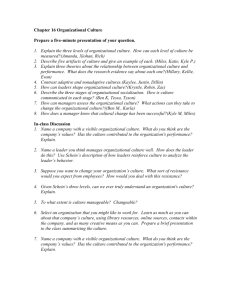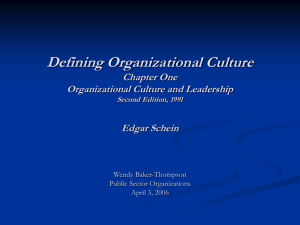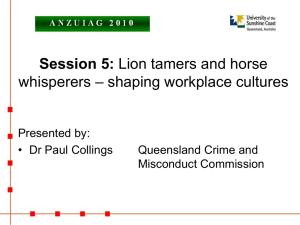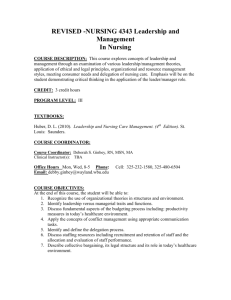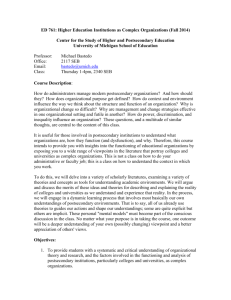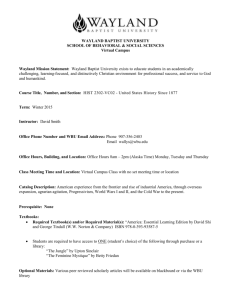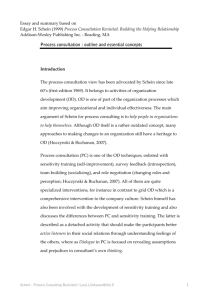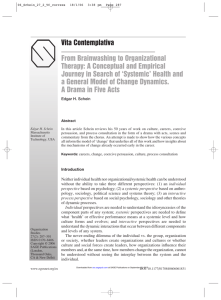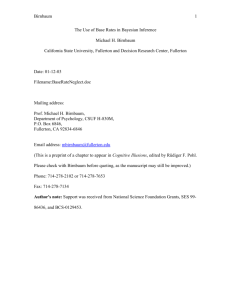Wayland Baptist University
advertisement
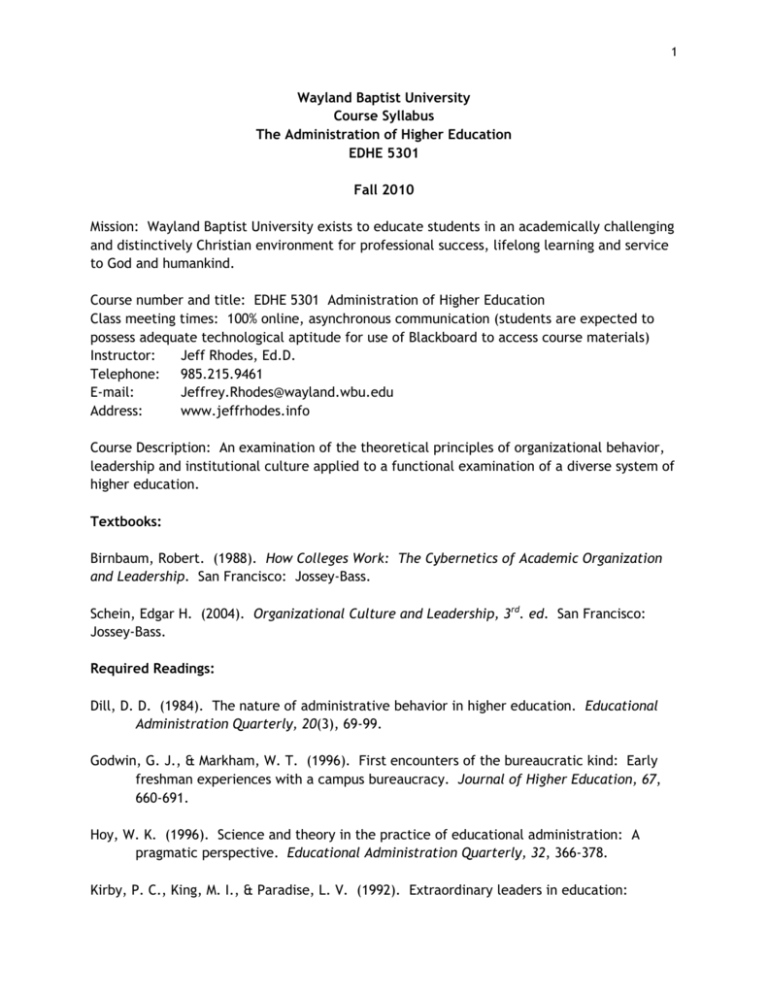
1 Wayland Baptist University Course Syllabus The Administration of Higher Education EDHE 5301 Fall 2010 Mission: Wayland Baptist University exists to educate students in an academically challenging and distinctively Christian environment for professional success, lifelong learning and service to God and humankind. Course number and title: EDHE 5301 Administration of Higher Education Class meeting times: 100% online, asynchronous communication (students are expected to possess adequate technological aptitude for use of Blackboard to access course materials) Instructor: Jeff Rhodes, Ed.D. Telephone: 985.215.9461 E-mail: Jeffrey.Rhodes@wayland.wbu.edu Address: www.jeffrhodes.info Course Description: An examination of the theoretical principles of organizational behavior, leadership and institutional culture applied to a functional examination of a diverse system of higher education. Textbooks: Birnbaum, Robert. (1988). How Colleges Work: The Cybernetics of Academic Organization and Leadership. San Francisco: Jossey-Bass. Schein, Edgar H. (2004). Organizational Culture and Leadership, 3rd. ed. San Francisco: Jossey-Bass. Required Readings: Dill, D. D. (1984). The nature of administrative behavior in higher education. Educational Administration Quarterly, 20(3), 69-99. Godwin, G. J., & Markham, W. T. (1996). First encounters of the bureaucratic kind: Early freshman experiences with a campus bureaucracy. Journal of Higher Education, 67, 660-691. Hoy, W. K. (1996). Science and theory in the practice of educational administration: A pragmatic perspective. Educational Administration Quarterly, 32, 366-378. Kirby, P. C., King, M. I., & Paradise, L. V. (1992). Extraordinary leaders in education: 2 Understanding transformational leadership. Journal of Educational Research, 85, 303311. Mech, T. (1997). The managerial roles of chief academic officers. Journal of Higher Education, 68, 282-298. Weick, K. E. (1976). Educational organizations as loosely coupled systems. Administrative Science Quarterly, 21, 1-19. Weick, K. E. (1996). Fighting fires in educational administration. Educational Administration Quarterly, 32, 565-578. Whetten, D. A. (1984). Effective administrators: Good management on the college campus. Change, 16(6), 38-43). Access to WBU Learning Resources: www.wbu.edu/lrc; John Elliott, e-mail – elliotj@wbu.edu Supplementary Reading: The Chronicle of Higher Education, weekly publication. Course Outcomes: 1 Students will develop an understanding of organizational structure and mission for various institutional types 2 Students will develop an understanding of typical administrative structures in higher education 3 Students will develop an understanding of governance structures in higher education 4 Students will develop an understanding of the roles of mission and culture in institutional governance and decision-making 5 Students will develop an understanding of the impact of various leadership theories and approaches in higher education 6 Students will develop an understanding of the various institutional types in American higher education 7 Students will develop an understanding of the three missions of higher education 8 Students will develop a familiarity with professional literature applicable to administration of higher education in the United States 9 Students will demonstrate the ability to critically evaluate the effectiveness of administrative structures, priorities, and decisions 3 Assignments and Evaluation: Online discussion: The instructor will post discussion questions each week. Every member of the class is expected to engage each topic in a thoughtful and critical manner, utilizing her/his own professional experience in higher education, accepted theories of leadership, existing research, and a logical argument. Personal attacks and racial/ethnic/sexist or otherwise discriminatory or disparaging comments will not be tolerated. Participation in the discussion will constitute 20% (20 points) of your final grade. Interview: Each student will be required to interview an administrator (President, Vice President, Assistant/Associate Vice President, or Dean) at a postsecondary institution. Each student will provide a transcript of that interview, as well as an analysis of important concepts learned from the individual interviewed. The analysis may be no more than five pages in length. Examples of items to be covered in this interview include (but are not limited to): 1 Organizational structure of the area supervising and reporting to this administrator 2 Specific responsibilities of this individual and her/his area of responsibility 3 Current issues/challenges for this individual and her/his department/division/area 4 Mission of the institution served 5 Environmental/cultural factors impacting effectiveness of this individual 6 Successes this individual has achieved and contributing factors 7 Failures for the individual and/or institution and lessons learned 8 Unspoken expectations and challenges faced This project will constitute 20% (20 points) of your final grade, and it must be in APA format. Case Study: Each student will be responsible for examining the Ward Churchill case from recent higher education events and preparing a paper outlining the occurrence, responses, and individuals involved. You will describe your view of the successes and failures of significant actors within the event, factors contributing to the decisions made, and your view of what could or should have been done differently. Lastly, you will describe how you believe this case will impact higher education in the United States in the coming years. Possible facets to cover include (but are not limited to) institutional mission, racism in higher education, academic freedom, tenure, and governance. This paper may be no longer than 10 pages. This project will count for 20% (20 points) of your final grade, and it must be in APA format. Paper: Each student will write a paper on one of the topics below. Each student will address a different topic, therefore you must request approval for the topic you desire. The paper will be no more than 10 pages (excluding references). The paper must follow the style of the APA manual (6th edition). 1 Some state that a college or university should be run like a business. Do you agree or disagree? Why? In what ways is an institution like and/or unlike a for-profit venture? In what ways should an institution be operated in a manner similar to for-profit organization? 4 What leadership style is most appropriate to, and effective in, higher education? Why? What is the value of tenure to postsecondary education as compared to its cost? What is the purpose and value of academic freedom? What is the role of accreditation in determining academic quality? Many institutions commit considerable resources toward improving their standing in institutional rankings, most notably those from the U.S. News and World Report. What is the purpose and value in doing so? Should it be a priority? Why or why not? 7 What is the role of athletics in postsecondary education? How does it complement or detract from the institutional mission? The paper will constitute 20% (20 points) of your final grade. 2 3 4 5 6 Final: You will be given two questions later in the semester, which will be similar to those you will face on the Master’s comprehensive exam at the conclusion of your studies. You will pick one and write a response that is no more than five pages in length. The paper will be open book, open note, and you may use other research resources at your disposal. Format must be consistent with the APA manual (6th edition). The final will comprise 20% (20 points) of your final grade. ATTENDANCE POLICY: Students are expected to read each week’s assigned reading in the text and actively engage their class members and the instructor in the online discussion each week. Failure to effectively interact and demonstrate completion of the reading will be considered nonattendance. METHOD OF INSTRUCTION: This course is taught entirely online using asynchronous interaction. UNIVERSITY GRADING SYSTEM: A B C D F 90-100 80-89 70-70 60-69 below 60 X Cr for Credit NCR No Credit I Incomplete* W for withdrawal WP Withdrawal Passing WF Withdrawal Failing No grade given IP In Progress A grade of “CR” indicates that credit in semester hours was granted but no grade or grade points were recorded. *A grade of incomplete is changed if the work required is completed prior to the date indicated in the official University calendar of the next long term, unless the instructor designates an earlier date for completion. If the work is not completed by the appropriate date, the I is converted to the grade of F. An incomplete notation cannot remain on the 5 student’s permanent record and must be replaced by the qualitative grade (A-F) by the date specified in the official University calendar of the next regular term. 6 Disabled persons: It is University policy that no otherwise qualified person with disabilities be excluded from participation in, be denied the benefits of, or be subject to discrimination under any educational program or activity in the University. It is the responsibility of the student to disclose her/his disability and to provide documentation pertaining to the disability to that appropriate modifications/accommodations may be made. Academic Honesty: University students are expected to conduct themselves according to the highest standards of academic honesty. Academic misconduct for which a student is subject to penalty includes all forms of cheating, such as illicit possessions of examinations or examination materials, forgery, or plagiarism. (Plagiarism is the presentation of the work of another as one’s own. Disciplinary action for academic misconduct is the responsibility of the faculty members assigned to the course. The faculty member is charge with assess the gravity of any case of academic dishonesty, and with giving sanctions to any student involved. Penalties may be applied to individual cases of academic dishonesty. See catalog for more information about academic dishonesty. Calendar: Week of August 16th Introductions – post a brief auto-biographical sketch in the homepage section of Blackboard that will allow the rest of the course participants to understand you and your context Whetten (1984) Weick (1976) Birnbaum, chapter 1 Schein, chapter 1 Paper topic requests due by 11:59 p.m. CST, Saturday, August 21st August 23rd Birnbaum, chapter 2 Schein, chapters 2 – 4 August 30th Birnbaum, chapter 3 Schein, chapters 5 – 6 Mech (1997) Interviews due by 11:59 p.m. CST, Saturday, September 4th September 6th Birnbaum, chapter 4 Schein, chapters 7 – 8 Godwin & Markham (1996) September 13th Birnbaum, chapter 5 Schein, chapters 9 – 10 Hoy (1996) 7 Case studies due by 11:59 p.m. CST, Saturday, September 18th September 20th Birnbaum, chapter 6 Schein, chapter 11 September 27th Birnbaum, chapter 7 Schein, chapters 12 – 13 Kirby, King, & Paradise (1992) October 4th Birnbaum, chapter 8 Schein, chapters 14 – 15 October 11th Birnbaum, chapter 9 Schein, chapters 16 – 17 Weick (1996) October 18th Schein, chapters 18 – 19 Final exam questions disseminated Papers due by 11:59 p.m. CST, Saturday, October 23rd October 25th Dill (1984) Final exams due by 11:59 p.m. CST, Saturday, October 30th
